|
The Swahili term baraza describes informal meetings and regular discussion rounds among neighbours and friends that occur in everyday street life on the Swahili coast, usually in front of houses and in a casual atmosphere. The term also signifies the location where these gatherings commonly take place: the stone benches on the outer walls of houses in East African coastal towns. These gatherings give locals the opportunity to communally discuss, interpret and question any topics of interest to the attendees and may include the latest news and gossip as well as cultural topics, and religious and political conversations and discussions. In this spirit, the baraza constitutes a place and time for the exchange of knowledge within a familiar social context.
The ZMO-baraza is a Swahili-speaking meeting point, a kind of jour fixe for Swahilophone researchers, advanced students and interested members of the public. Each meeting is ranked around a talk or presentation that may be more or less academic in character; from research papers to biographical accounts a broad range of topics can be covered in this ongoing series of informal discussions. On the one hand, as a platform for academic exchange on research-related topics, the ZMO-baraza is open to contributions in disciplines ranging from linguistics, literature and history, over to political science, philosophy and social anthropology. It thus acts as a platform for the presentation and discussion of research as well as literary documentation and translation. On the other hand, the ZMO-baraza offers a space for literary and biographical presentations by East African authors, poets and other personalities, and for discussions with them.

The very first ZMO-baraza took place in July 2008 with two prominent guests from Kenya: The Kenyan poet Ustadh Ahmad Nassir who recited a selection of his poems and the former politician and Islamic scholar, Sheikh Abdilahi Nassir who gave a speech on “Kenyan Muslims and the Righting of Historical Injustices: the Case of Mwambao”  . .

Baraza - Events 2012
Since the winter term 2009/10 the ZMO-baraza has been jointly organized by Kai Kresse (ZMO, Berlin) and Lutz Diegner (Humboldt University, Berlin). Unless otherwise announced, it takes place at the ZMO every first Thursday of the month at 4pm.

Thursday, 03 May 2012, 4 pm, ZMO
Masomo na Maisha yetu Milimani: Muhula mmoja wa kujifunza Chuo Kikuu cha Dar es Salaam – Our Studies and Lifes in Milimani: A Semester abroad at the University of Dar es Salaam
Baraza with Ina Herzberg, Lorenz Herrmann and Vincent Favier (Students of Humboldt University Berlin)
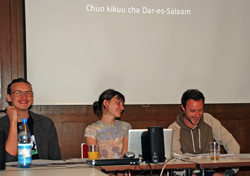 |
The three students told us vividly about their semester abroad at the University of Dar es Salaam. With the aid of video recordings and pictures they were able to show us some of their experiences in Tanzania. They talked about their daily life in Dar es Salam, about new musical passions, about building friendship as well as about throwbacks like illnesses or unpleasant encounters. They have noticed especially the hard conditions for Tanzanian students. Especially the poor |
living conditions don’t allow for enough space, privacy and quiet for studying which leads to many protests by the students. |

Tuesday, 22 May 2012, 4 pm, HU Berlin
Lugha ya Kiswahili inavyoakisi siasa na mabadiliko ya uchumi Tanzania – Kiswahili through the Prism of Politics and economic developments in Tanzania
Baraza with Aldin Mutembei (University of Dar es Salaam)
On the basis of magazines and parliamentary speeches in Tanzania after independence, Aldin Mutembei analyzes the use of Kiswahili in the realms of politics and economy. He focusses on the question how language can reflect the ideological changes in the said areas. Mutembei’s assumption is that the use of Swahili shows a significant political shift in Tanzania. A shift from the sense of community and of a united nation to intensified individualism. Nowadays you can find more ”u-mimi” instead of ”u-sisi”! This leads to questions about the condition of the Tanzanian nation as well as about the future of Kiswahili.
|
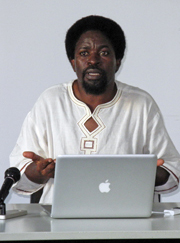
|
Audiodocumentation  |

Thursday, 07 June 2012, 4 pm, ZMO
Ukoloni wa Kiingereza na Afya ya Mtoto katika Tanganyika – British Colonialism and Children’s Health in Tanganyika
Baraza with Oswald Masebo (University of Dar es Salaam)
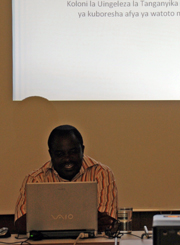
|
In his talk Oswald Masebo reported from his research on campaigns for children’s health care by the British colonial government in Tanganyika during the 1920s and 30s. The fight to reduce child mortality was mainly focussed on educating the mothers whose alleged ignorance was considered to be the decisive factor. Crucial extern causes like wars, the results of German colonial administration, poverty and hunger as well as imported diseases like influenza and smallpox have been wilfully ignored. According to Masebo‘s theory these campaigns haven’t been implemented out of pure altruism but rather to legitimize and popularize the new colonial power by „good deeds“. Furthermore, the colonial economic system needed a sufficing body of (healthy) workers. |
Audiodocumentation  |

Tuesday, 19 June 2012, 4 pm, HU Berlin
Mabadiliko ya Fasihi na Sanaa za Tanzania baada ya Siasa ya Ujamaa – Changes in Literature and Arts in Tanzania after Ujamaa
Baraza with Lilian Temu-Osaki (University of Dar es Salaam)
This baraza was dedicated to the coherences and interactions between art and politics. How does creativity develop in changing political systems within one country? What are the effects of ideological shifts on the society and the national identity? Lilian Temu-Osaki analyses especially those writers who experienced the situation before, during and after Ujamaa first-hand. In the modern-day Tanzania she observes a general disorientation and states that it becomes more and more opaque which political system is ruling the country. Consequently, she has difficulties to identify the writer’s ideological backgrounds and their target audience |
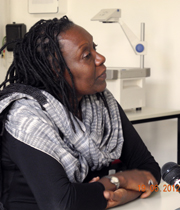
|
|

Tuesday, 03 July 2012, 4 pm, HU Berlin
Reading with Euphrase Kezilahabi (University of Botswana)
|
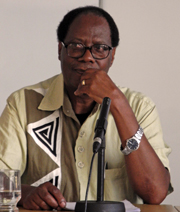
|
Professor Kezilahabi was reading sections of his famous and groundbreaking works Nagona and Mzingile. Nagona describes the human search for cognition and truth. The first postmodern Swahili novel Mzingile also deals with these questions but Kezilahabi goes deeper into the matter of religion and its role. Fortunately, we could discuss many of the questions immediately after the reading, together with the author of these sophisticated texts.
|
| |

Thursday, November 1st, 2012, 4pm, ZMO
“Ushairi Unaokonga Moyo: Taarab ya Nadi Ikhwan Safaa ya Unguja” – “Poetry in Motion: The Music and Poetry of Zanzibar's Oldest Taarab Orchestra”
Baraza with Prof. Kelly Askew (University of Michigan/Wissenschaftskolleg zu Berlin)
Kelly Askew presented her documentary on the 100th anniversary of Zanzibar’s oldest Taarab musical club: founded in 1905 the „Nadi Ikhwan Safaa“ harks back to a long tradition that is closely linked with the island’s history. The documentary tells us about the historical developments like the upheavals following the revolution and the opening of the orchestra for female members. At the same time the film shows us the beauty of this sentimentally sung poetry and elaborate musical ornamentation. |
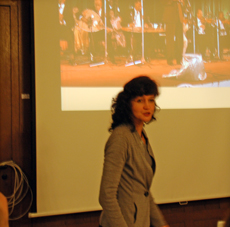
|
|

Tuesday, December 4th, 2012, 4pm, ZMO
“Paukwa – filamu juu ya mwanatamthilia maarafu Ebrahim Hussein” – “Once upon a time – a film on the playwright Ebrahim Hussein”
Baraza with Alex MacBeth (Journalist and filmmaker)
Alex MacBeth presented to us „Paukwa“, his 2008 documentary on the life and work of Ebrahim Hussein. He told us about the difficulties and rewards of meeting the reclusive author known for his social and politic commentary in plays like „Kinjeketili“ and „Wakati Ukuta“. MacBeth was especially surprised by the decreasing popularity of the significant Swahili dramatist in his native Tanzania.
Audiodocumentation  |
|

|